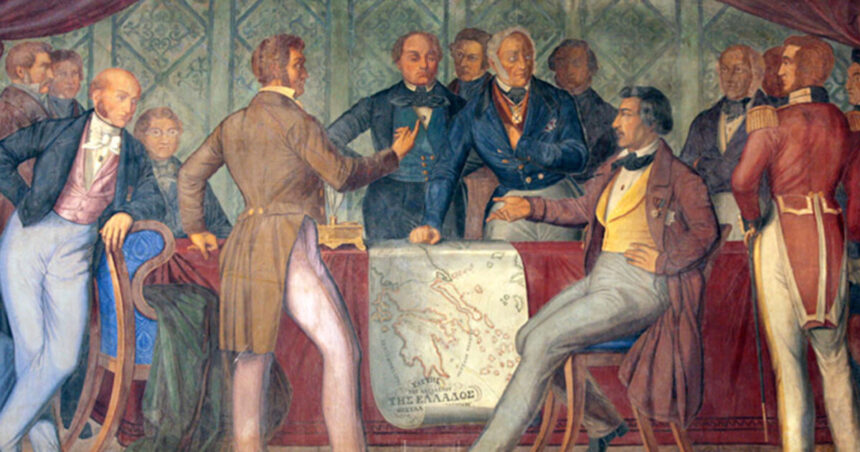As the facts changed, gradually the Great Powers began to revise their attitude towards the Greeks and the Greek Revolution. Initially, Great Britain but also Russia later became more interested in the developments, proceeding to sign the Protocol of Petersburg in 1826, which provided for the creation of an autonomous Greek state. After the refusal of the Ottoman side to accept this arrangement, England, Russia and France proceeded to sign a new agreement in 1827, which called for the establishment of an autonomous Greek state. Facing the new refusal of the Sublime Gate, the Great Powers, in order to enforce their terms, would face the Ottoman fleet victoriously in the naval battle of Navarino in the same year.
However, despite the armed intervention of the Great Powers, many problems remained unsolved, such as the exact nature of the new state (autonomous, as the Powers wanted or independent, as the Greeks wanted) or the territories it would include. Furthermore, the refusal of the Ottoman Empire to accept the creation of a Greek state of any kind made matters even more difficult. Two years later, in March 1829, a protocol would be signed which contained the condition that Greece would be under the suzerainty of the Sublime Porte, while at the same time determining an annual tribute to the Sultan of 1,500,000 grosci. A border line was defined at the height of the Amvrakikos-Pagasitic gulf, while a Christian hereditary ruler of Greece, foreign to the royal families of the three powers, who would be elected jointly with the acceptance of the Great Powers and the Ottomans, was also foreseen.
The High Gate was forced to accept the decisions of London when it was definitively defeated by Russia. Nevertheless, the developments that took place in the region during the Russo-Turkish War of 1828-1829 and then, with the subsequent Russian victory, would lead to a change in the balance between the Great Powers. The latter would in turn lead England and France to view the version of the independent Greek state with a more positive eye, in an attempt to control and limit Russian primacy in the region. An important role in this outcome was played by Ioannis Kapodistrias, as Governor of Greece from 1828, who exerted diplomatic pressure on the Powers.
Thus, on February 3, 1830, the London conference was held – after an English proposal – which declared the political independence of Greece with Article 1 of the Protocol signed by the representatives of England, France and Russia. Article 1 of the Protocol of February 3, 1830 defined more specifically: “Greece will form an independent State, and will enjoy all the just, political, administrative and commercial, accessions to full independence”.
This solemn declaration of the political independence of Greece constituted a founding diplomatic act of the establishment of the Greek state. The international recognition of the Greek state meant the beginning of its existence from the point of view of international society, as Greece was now officially a sovereign and independent state with all the rights – political, administrative, commercial – that emanated from its independence, which would extend south of the border line defined by the rivers Acheloos and Sperchios.
Column editor: Myrto Katsigera, Vassilis Minakakis, Antigoni-Despina Poimenidou, Athanasios Syroplakis




